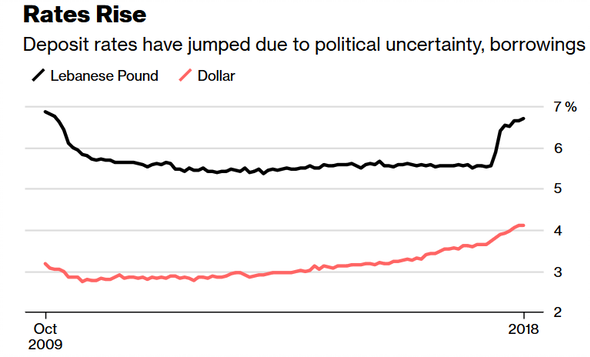jassemajaka@gmail.com
Lebanon’s Leadership Vacuum Has Banks Battling for Deposits
By Donna Abu-Nasr and Arif Sharif
Deposit rates jump to nine-year high on political uncertaintyPrime Minister-designate faces difficulties in forming cabinet By Donna Abu-Nasr and Arif Sharif July 19, 2018, 2:00 AM GMT+3 Lebanon’s banks are paying the highest interest rates on deposits in almost nine years as lenders seek to shore up their capital to cope with political uncertainty and the high borrowing needs of the government. The weighted average rate on customer deposits in Lebanese pounds climbed to 6.71 percent at the end of May, the highest since December 2009, according to the most recent central bank data. Average rates on dollar deposits rose to 4.11 percent, a level not seen since February 2008. Similar interest rates in Jordan were at 4.38 percent at the end of May.
Non-residents contributed 24 percent of the overall deposits of Lebanon’s banks at the end of May, the central bank data show. With at least three times as many Lebanese living abroad than at home, Lebanon has been sustained by remittances, mainly from the Gulf and Africa, which banks use to buy government debt.
Deposit rates will only begin to decline once Prime Minister-designate Saad Hariri forms a new government and starts taking steps to rein in the fiscal deficit, according to Jassem Ajaka, professor of economy at the Lebanese University. The budget shortfall may climb to 10.6 percent of gross domestic product this year, the most since at least 2015, according to the International Monetary Fund.
His resignation in November — rescinded a month later — led to an outflow of capital and roiled markets in the Arab world’s most indebted country. Hariri has struggled to pull together a cabinet since the Iran-backed Hezbollah group emerged in a stronger position in May’s parliamentary elections, leaving the fiscal-consolidation plans in flux. Lebanon will likely see its debt reach 180 percent of gross domestic product in five years from 150 percent in 2017, according to the IMF. That’s on par with Greece, which underwent the world’s biggest debt restructuring.
‘Stimulate Growth’
The rise in rates paid on deposits is due to “the continuing high borrowing needs of the government and the need to stimulate growth,” said Nassib Ghobril, the chief economist at Beirut-based Byblos Bank SAL. “There is lack of credible political will to reduce the fiscal deficit through reforms so far.”
Bank deposits are expected to grow by 5 percent this year, Central Bank Governor Riad Salameh, told Lebanon’s Annahar newspaper July 11. An offer by Bank Audi to pay 15 percent interest on deposits converted from U.S. dollars to Lebanese pounds supported the local currency and he encouraged other banks to take steps that will benefit the pound. Reserves, which fell to about $41.5 billion from more than $43 billion at the end of October, stand at about $44 billion, the newspaper reported.
The formation of a government is crucial to win international aid and boost an economy that’s been hit by the outbreak of the seven-year conflict in neighboring Syria. Trade routes to the Gulf have closed and the influx of 1.5 million refugees has strained Lebanon’s fragile infrastructure.


